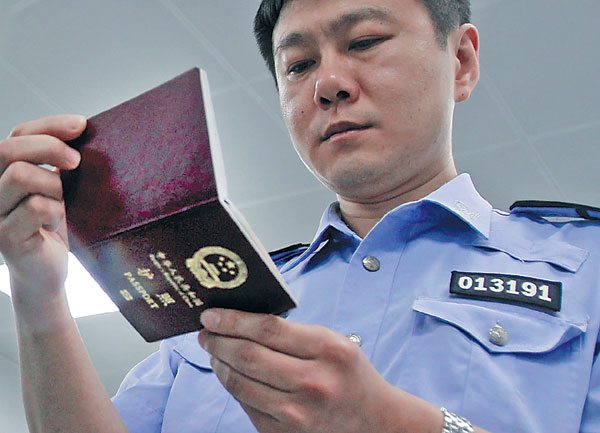 |
|
A police officer from the exit-entry administration of Beijing Public Security Bureau presents the new e-passport, which is to be issued on May 15. Provided to China Daily |
China's e-passports will better protect citizens' personal data and national security, said customs officials on Tuesday, as authorities nationwide geared up for the introduction of the new high-tech system.
The 48-page travel document, which will be issued starting May 15, is fitted with a chip on the last page. Each page has an anti-forgery label.
Only police and customs authorities will be able to access the information on the chip, which includes the holder's name, photograph and fingerprints.
"In this way, no one can copy or use an e-passport that is lost or stolen," said Tang Lei, head of e-passport management for Beijing Public Security Bureau's exit-entry administration.
"The e-passport will be effective in protecting national security and convenient for residents when passing through customs checkpoints."
So far, more than 100 fingerprint recorders have been installed at the exit-entry administrations that process applications across the capital. Authorities say that staff members responsible for coping with the application work have received extensive training.
|
Visa text message Beginning Wednesday, foreigners in Beijing will receive a text message reminding them to have their visas extended, according to the exit-entry administration of Beijing Public Security Bureau. More than 900 foreigners in the capital, whose visas, residence permits or accommodation registrations will expire soon, will be the first to receive the texts, according to the administration. The message will be sent one month before visas expire, said Lin Song, an officer at the administration. "It's a new service for foreigners in Beijing, aiming to help them avoid forgetting to extend their visas and relevant certificates," he told China Daily. According to recent statistics from the Ministry of Public Security, about 80 percent of foreigners identified as illegally residing in China do not do so intentionally. Instead, most are unaware of China's residence regulations and forget to extend their visas. Cao Yin |
Starting May 15, new applicants will get e-passports after storing thumb fingerprints and signatures, while old passports can still be used, if valid, said Lin Song, an officer in the administration.
The cost for the passport application will remain 200 yuan ($30).
The application process in Beijing will be suspended on Monday to transfer the system.
In Shanghai, the acceptance of passport applications will be suspended for the three work days prior to May 15 to prepare devices and make system upgrades, said Li Feng, a publicity official for the Shanghai Public Security Bureau's exit-entry administration.
More than 90 countries in the world, including the United States and Japan, already use e-passports, according to the administration.
"It's inevitable for such advanced technology to step into residents' lives," said Tang, who hailed the arrival of e-passports as an important step for China to take toward automatic processing at customs points.
"If the e-passport is developed well in China, the automatic pass, or pass without labor management, in customs will be implemented as soon as possible," Tang said, adding that it would be like the self-service ticketing on buses in the capital.
However, exactly when that could be realized is uncertain, he said.
The e-passport service has received plaudits from applicants.
"A passport can sometimes work as a substitute ID card when checking in at hotels or boarding a flight. It would be horrifying if my passport was fraudulently used by others," said Zhou Shuwen, 25, who works in a public relations agency in Shanghai.
However, others fear the need for fingerprints will be inconvenient, especially when it comes to visas.
"I have to personally go to the site to give my fingerprint with this new passport," said Tang Wenzhe, a Shanghai native and a travel enthusiast.
"Then what is the need to pay for travel agencies? I want them to help me with the string of application procedures," she added.
According to the Ministry of Public Security, China issues more than 10 million regular passports every year, and that number is increasing by 20 percent annually.
